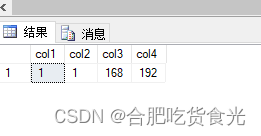PARSENAME (parseName)
returns the specified part of the object name. The object parts that can be retrieved are the object name, the owner name, and the description PARSENAME function does not indicate whether the object with the specified name exists, but only returns the specified part of the given object name. Otherwise NULL.
语法
PARSENAME ( 'object_name' , object_piece )
illustrate
According to "." as a separator, quickly obtain the decomposed part, which can only be split into 4 fields at most.
'object_name'
The name of the object whose specified part is to be retrieved. The data type of object_name is sysname . This parameter is an optional qualified object name. If all parts of the object name are qualified, the name can contain four parts: server name, database name, owner name, and object name.
object_piece
The part of the object to return. The data type of object_piece is an int value, which can be the following values:
1 = object name
2 = schema name
3 = database name
4 = server name
The PARSENAME function does not indicate whether an object with the specified name exists. PARSENAME returns only the specified part of the specified object name.
Example 1:
Select parsename('A,B,C.C,E.F',2)

Example 2:
Replace '.' because parsename only recognizes '.'
DECLARE @PA TABLE
(COL VARCHAR(80))
INSERT INTO @PA
SELECT'123_12_124'UNION ALL
SELECT'1234_125_1243' UNION ALL
SELECT'12345_1245_12435' UNION ALL
SELECT'123456_12456_124356'
SELECT COL, COL1 =PARSENAME(REPLACE(COL,'_','.'),3),
COL2 =PARSENAME(REPLACE(COL,'_','.'),2),
COL3 =PARSENAME(REPLACE(COL,'_','.'),1)
FROM @PAresult:

Example 3: Mainly used for IP address segmentation
DECLARE @ip NVARCHAR(50) = '192.168.1.1';
SELECT
PARSENAME(@ip, 1) AS col1,
PARSENAME(@ip, 2) AS col2,
PARSENAME(@ip, 3) AS col3,
PARSENAME(@ip, 4) AS col4;
result:

Example 4: Convert to standard IPv4 format
CREATE FUNCTION [dbo].[svf_ConvertToStandardIPv4]
(
@IP NVARCHAR(MAX)
)
RETURNS NVARCHAR(MAX)
AS
BEGIN
RETURN REPLICATE('0',3 - LEN(PARSENAME(@IP,4))) + PARSENAME(@IP,4) + '.' +
REPLICATE('0',3 - LEN(PARSENAME(@IP,3))) + PARSENAME(@IP,3) + '.' +
REPLICATE('0',3 - LEN(PARSENAME(@IP,2))) + PARSENAME(@IP,2) + '.' +
REPLICATE('0',3 - LEN(PARSENAME(@IP,1))) + PARSENAME(@IP,1)
END
go
SELECT [dbo].[svf_ConvertToStandardIPv4] ('8.8.8.8')
Mainly used for ip address resolution
It should be noted that it can only be split into 4 fields at most.
For others, you can replace it with REPLACE
Another idea: write a function
Use SUBSTRING and CHARINDEX to intercept and split fields according to specific segmentation symbols